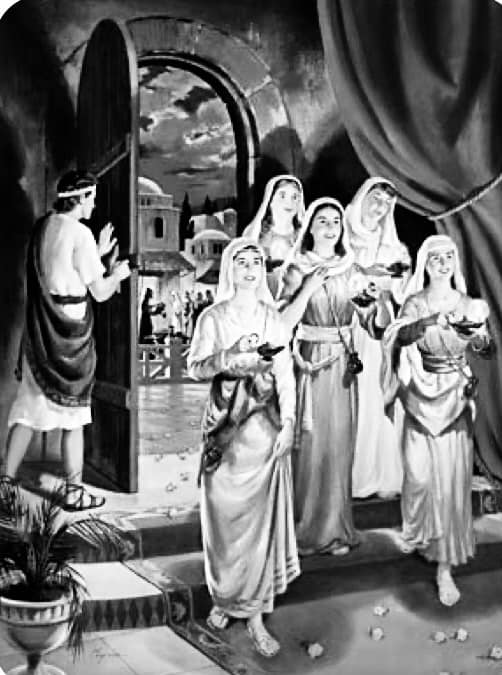9,281 total views

Beginning Chapter 24 of the gospel of Matthew Jesus begins to prepare his disciples for what is to come (24:—25:46). The imminent destruction of Jerusalem and its Temple becomes a metaphor for the final judgment at the close of the age, a warning and encouragement to be constantly in a state of preparedness for the coming of the Son of Man.
The parable of the ten virgins found only in his gospel (25:1-13) should be understood within this context. It is about that “hōra” ( ὥρα ). Though the word retains the translation “hour” (literally the sixty-minute intervals), it refers to a “time” or “period of time” that is of special import, like the “hora”: of Jesus in Gethsemane (Mk 14:35), of incense/worship (Lk 1:10), of Jesus’ earthly destiny- his arrest and crucifixion (Lk 22:53; Jn 2:4; 7:30), of Jesus’ suffering (Jn 12:27; 13:1), of the glorification of the Son of Man (Jn 12:23; 17:1) and the last hour in an eschatological sense (25:13).
The wedding (v1) as an eschatological symbol, pointing to the definitive marriage of God and his people, comes from the Hebrew scriptures (Hosea, Canticles) and appears elsewhere in the New Testament (9:14f; 22:1-14; Rev 21:9f). Here it gives the story a parousia setting. The “kingdom of heaven” is not likened to the ten virgins but rather to the main point of the whole story that follows. The virgins, who would have served as the groom’s attendants are termed “wise” and “foolish” (v2) given the parable’s outcome, and not of any antecedent considerations. Their role here is to symbolize the Christian disciple (2 Cor 11:2). Since all the virgins sleep, the point being made is preparedness rather than constant alertness. The oil refers to the state of readiness, (though allegorically understood also as good works (cf 5:15 “lighted lamps”).
The bridegroom’s return late at night points to the uncertain and unexpected time of the Lord’s coming (v6). Both the request of the excluded virgins and the groom’s response (w11f) center on the danger of disparity between belief and conduct (5:21f). Election of itself gives no assurance of final salvation(cf 7:1-22). In other words, in between faith’s inception and its consummation, it must be nurtured and grow, accompanied always by a spirit of expectation (v13; 24:42,44).
As we are about to end the liturgical year once again, we are also reminded of the truth about the “end” of times and/or of our own lives. May we all remain wise (with the wisdom of those eternal verities which God imparts to us; cf 1st reading Wis 6:12-16) and prepared by keeping our lamps burning (remaining faithful to the Lord with our life shining with good deeds), as we wait for coming the coming of the Lord whatever the day or the hour. Amen.

















